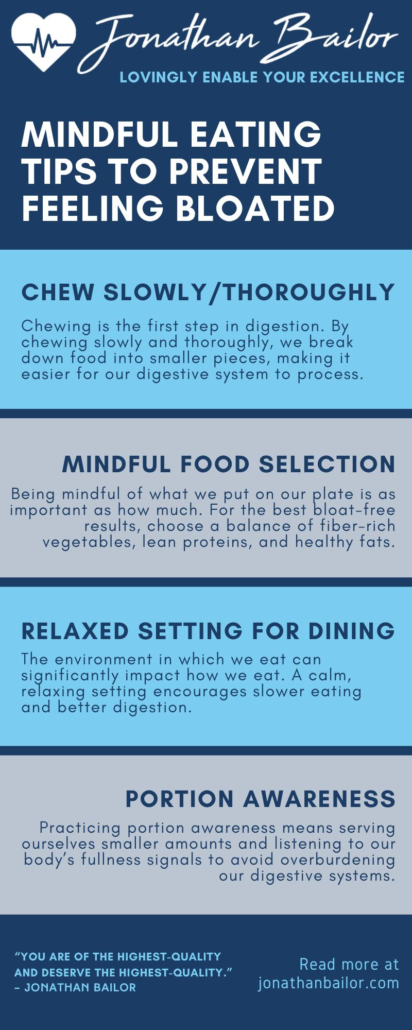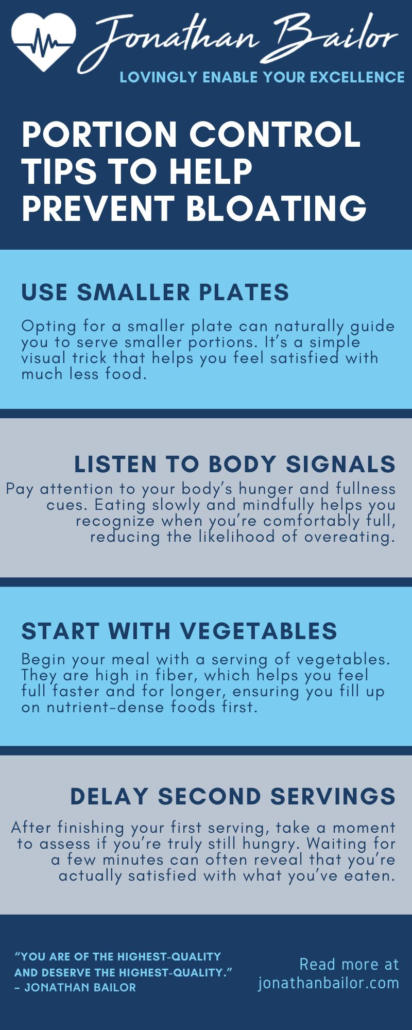20 Ways to Feel Less Bloated After Big Holiday Meals
Holidays are a time of joy, a time to be with loved ones, share stories, and, of course, indulge in those delicious, once-a-year dishes. But let’s face it: after enjoying the festive spread, we often find ourselves grappling with the discomfort of bloating. It’s like a holiday hangover, but in your tummy. Let us dive into this awesome gut health guide with Jonathan Bailor to feel less bloated during holiday meals!
Take care of your gut health from top to bottom with our 28 Proven Ways to Boost the Effects of Probiotics for Gut Health and 6 Ways to Beat Holiday Belly Bloat guides!
The good news is that there are practical, straightforward ways to alleviate this bloating, and they don’t require drastic changes to your holiday traditions or skipping your favorite dishes.
First, let’s understand bloating a little better. Bloating is often a natural response of your body to certain foods, eating habits, or even how we combine our foods. It’s the body’s way of saying, “Hey, I’m a bit overwhelmed here!” Think of it as a traffic jam in your digestive system. Now, wouldn’t it be great if we could manage this traffic better? That’s precisely what these 20 tips aim to do.
What’s more, these tips are easy to share with friends and family. They’re not just about personal wellness; they promote communal health. Imagine if everyone at your holiday gathering could enjoy the meal and feel great afterward. That’s the spirit of sharing and caring that embodies the holiday season.
So, let’s dive into these 20 tips and make this holiday season not just about great food but also about great feelings. Remember, it’s not about missing out; it’s about enhancing your experience—one meal at a time.
Mindful Eating: A Key to Feeling Less Bloated
Mindful eating is an effective strategy for combating the discomfort of bloating, especially during the indulgent holiday season. It involves being fully present and attentive to the experience of eating, recognizing the body’s hunger and fullness signals, and appreciating the flavors and textures of food.
By practicing mindful eating, we give our digestive system the time and conditions it needs to process food effectively so that it doesn’t produce gas as readily. This reduces the likelihood of bloating. This approach not only enhances our digestive health but also enriches the overall eating experience, making holiday meals more enjoyable and satisfying.
Let’s look at four key mindful eating techniques that you can use this holiday season:
1. Chew Slowly and Thoroughly to Prevent Bloating
Chewing is the first step in digestion. By chewing slowly and thoroughly, we break down food into smaller pieces, making it easier for our digestive system to process. This practice also reduces the amount of air swallowed during eating, a common cause of bloating. (Swallowed air often leads to intestinal gas).
Aim for about 20–30 chews per bite. This deliberate pace allows us to savor each mouthful and listen to our body’s satiety cues, preventing overeating, which often leads to bloating.
2. Mindful Selection of Foods
Being mindful of what we put on our plate is as important as how much. Choose a balance of fiber-rich vegetables, lean proteins, and healthy fats. Be cautious with foods known to cause bloating, like overly processed dishes or those high in artificial sweeteners.
This conscious selection of foods helps maintain digestive balance and reduces bloating.
3. Eating in a Relaxed Environment
The environment in which we eat can significantly impact how we eat. A calm, relaxing setting encourages slower eating and better digestion. Avoid eating on the go or in a rushed manner. Take a moment to breathe deeply before starting your meal, creating a sense of calm. Eating in a relaxed environment helps prevent the hurried eating that often leads to bloating.
Incorporating these mindful eating practices into holiday meals significantly affects how we feel post-feast. It’s about enjoying the holidays to their fullest, with delicious food and cherished company, without the discomfort of bloating.
4. Portion Awareness
It’s easy to load our plates with more food than we need during holiday meals. Practicing portion awareness means serving ourselves smaller amounts and listening to our body’s fullness signals. It’s about enjoying our favorite holiday dishes without overburdening our digestive systems.
Remember, we can always go back for a little more if we’re genuinely still hungry, but starting small is a key step in preventing bloating.

Feeling Better Is Priceless, That's Why We Don't Put A Price On It!
“It’s Like A Free and Medically Valid Version of Noom and Weight Watchers Online”
~ Dr. Doctor Matthew Oleshiak, MD
Click the 'LEARN MORE' button below for free lifetime access to the fast fix program developed by Jonathan and top Ivy League Medical Doctors
LEARN MOREP.S. It's not a free trial. It's not part of the program for free. The entire program is free, forever, for real! No credit card needed.
Smart Food Choices: Your Ally Against Stomach Bloating
Making smart food choices is a crucial strategy in combating stomach bloating. The types of food we eat can significantly impact how we feel after a meal, especially during the holiday season when indulgence is at its peak.
Opting for foods that are easy to digest and low in certain carbohydrates that cause bloating can make a substantial difference. Conversely, avoiding foods that tend to produce excess gas or disrupt digestive processes is equally important.
Let’s explore specific food choices that can help you sail through holiday meals without feeling bloated:
1. Choose Lean Proteins
Lean proteins, such as fish, chicken, and turkey, are easier for the body to digest than fatty meats. They provide essential nutrients without overburdening the digestive system. Opting for dishes with lean proteins during holiday meals can help minimize the likelihood of bloating. They’re not only a healthier choice but also help keep you satiated without the heaviness.
2. Opt for Low-FODMAP Vegetables
Some vegetables, although healthy, are high in FODMAPs (Fermentable Oligo-, Di-, Monosaccharides, And Polyols) and can trigger bloat, rapid weight gain, excessive gas, and stomach pain in some individuals. Opting for a low-FODMAP diet, especially vegetables like bell peppers, carrots, and tomatoes, can reduce the risk of digestive discomfort.
These vegetables are not only delicious but also provide valuable nutrients without contributing to bloating.
3. Limit High-Sodium Foods
Foods high in sodium can lead to water retention, contributing to a bloated feeling. Being mindful of the sodium content in holiday dishes, mainly processed and canned foods, can help manage bloating.
Choosing fresh ingredients over processed ones can significantly reduce sodium intake, aiding in better digestion.
4. Avoid Artificial Sweeteners
Artificial sweeteners, commonly found in diet sodas and sugar-free desserts, can be difficult for the body to digest. They can cause abdominal bloating, more gas production, and discomfort in some individuals. Opting for natural sweeteners like honey or maple syrup or sugar alcohols like erythritol or xylitolin moderation can be a better alternative during the holiday season.
By focusing on these smart food choices, you can significantly reduce the risk of stomach bloating during the holidays. It’s about enjoying the festive season with a mindful approach to eating, ensuring your meals are as comfortable as they are delicious.

Portion Control: A Balanced Approach to Avoid Stomach Bloating
Portion control is critical to managing stomach bloating, particularly during festive feasting. It’s about finding the right balance between satisfying your taste buds and not overloading your digestive system.
Eating large portions can overwhelm your stomach, leading to inefficient digestion and resulting in that uncomfortable, bloated feeling. By controlling portion sizes, you can enjoy a variety of holiday foods without the added discomfort of bloating. Portion control isn’t about restriction; it’s about enjoying your meals in a way that also respects your body’s digestive capabilities.
Let’s look at a few easy, stress-free ways to practice portion control:
1. Use Smaller Plates
Opting for a smaller plate can naturally guide you to serve smaller portions. It’s a simple visual trick that helps you feel satisfied with less food. On a smaller plate, a moderate portion looks more substantial, reducing the urge to overeat. This approach allows you to enjoy a variety of holiday foods without overburdening your digestive system.
2. Listen to Your Body’s Signals
Pay attention to your body’s hunger and fullness cues. Eating slowly and mindfully helps you recognize when you’re comfortably full, reducing the likelihood of overeating. It’s important to remember that it takes about 20 minutes for the brain to register fullness, so take your time with each bite to better gauge your body’s needs.
3. Start with Vegetables
Begin your meal with a serving of vegetables. They are high in fiber, which helps you feel full faster and for longer. This practice ensures you fill up on nutrient-dense foods first, leaving less room for larger portions of more calorie-dense items.
4. Wait Before Going for Seconds
After finishing your first serving, take a moment to assess if you’re truly still hungry. Waiting for a few minutes can often reveal that you’re actually satisfied with what you’ve eaten. This pause can be the difference between feeling just right and uncomfortably full.
Implementing these portion control tips during the holidays can help prevent bloating and enhance your overall dining experience. It’s about enjoying the festive holiday season’s delights in a way that keeps you feeling comfortable and content.

Harnessing Herbs: Natural Solutions for Stomach Bloating
Incorporating herbs into our diet is a time-honored and natural way to help prevent or reduce stomach bloating. Herbs not only add flavor to our meals but also possess digestive properties that can ease bloating, gas, and discomfort.
Many herbs stimulate digestion, improve gut motility, and aid in the release of trapped gas. They can be consumed in various forms, such as in teas, meal seasonings, or supplements. Embracing these natural remedies provides a gentle yet effective approach to maintaining digestive health, especially during times of dietary indulgence.
Here are four herbs that may help prevent bloating after eating a big holiday meal:
1. Peppermint
Peppermint is renowned for its ability to soothe the digestive tract and relieve bloating. The menthol in peppermint acts as a natural antispasmodic, relaxing the muscles of the digestive system and easing gas pain. Peppermint tea is a popular and refreshing way to enjoy these benefits, especially after meals.
2. Ginger
Ginger is another powerful herb known for its digestive benefits. It helps move food through the gastrointestinal tract, reduces inflammation, and can help relieve bloating and gas. Ginger can be consumed as a tea, added fresh to meals, or taken in supplement form.
3. Fennel
Fennel seeds have a long history of use in aiding digestion. They contain compounds that relax the muscles in the digestive tract, helping to release trapped gas and reduce bloating. Chewing fennel seeds or drinking fennel tea after a meal can be very effective in easing digestive discomfort.
4. Chamomile
Chamomile is not just a calming herb; it also has properties that can help reduce bloating. It soothes the digestive tract, relieves gas, and reduces inflammation. Enjoying a cup of chamomile tea in the evening can not only help with digestion but also promote relaxation and better sleep.
Utilizing these herbs as part of your dietary regimen is a delightful and natural way to support digestive health. They offer gentle, effective relief from bloating and enhance the overall eating experience with their aromatic flavors. Integrating these herbs into your meals or as teas can significantly affect how you feel, especially after indulgent holiday feasts.

Relaxation and Stress Management: Key to Improved Digestive Health and Bloating Reduction
Stress and relaxation profoundly impact digestive health and the management of bloating. Stress can trigger the body’s “fight or flight” response, diverting blood flow from the digestive system, slowing digestion, and potentially leading to bloating.
Conversely, relaxation techniques can help manage stress, enhance blood flow to the digestive organs, and improve the overall digestive process.
The four practices below are not just about maintaining a calm state of mind; they also help create an internal environment that supports healthy digestion.
1. Deep Breathing Exercises
Deep breathing is a simple yet effective technique for reducing stress and aiding digestion. It encourages full oxygen exchange, which can help relax the digestive and abdominal muscles and improve gut motility. Practicing deep breathing for a few minutes each day, especially before meals, can set the stage for more efficient digestion and reduced bloating.
2. Mindfulness Meditation
Mindfulness meditation involves focusing on the present moment and can be a powerful tool for managing stress. Regular practice can help calm the mind, reduce anxiety, and improve the body’s response to stress, which in turn benefits digestive health.
Even a short daily session of mindfulness meditation can have significant positive effects on both mental and physical well-being.
3. Regular Physical Activity
Engaging in regular physical activity is an excellent way to reduce stress and improve digestion. Activities like walking, yoga, or swimming not only provide physical benefits but also help release endorphins, the body’s natural stress relievers.
Incorporating moderate physical activity into your daily routine can help you manage stress and promote a healthy digestive system.
4. Progressive Muscle Relaxation
Progressive muscle relaxation involves gradually tensing and then relaxing different muscle groups in the body. This practice can help identify areas of tension and promote overall relaxation. Regular practice can reduce stress levels, improve bodily awareness, and indirectly support digestive health.
By incorporating these relaxation and stress management techniques into your daily life, you can create a more balanced and stress-free environment for your digestive system. Reducing stress not only improves your mental well-being but also plays a crucial role in maintaining digestive health and preventing bloating.

FAQs on Gut Health
Q1: What is the gut microbiome, and why is it important?
The gut microbiome refers to the vast community of microorganisms that reside in the digestive system, including bacteria, fungi, and viruses. This microbiome plays a crucial role in digestion, nutrient absorption, and immune system function. A balanced gut microbiome is essential for overall health, as it helps break down food, synthesizes vitamins, and protects against harmful pathogens. An imbalance in the gut microbiome can lead to digestive issues and may impact other aspects of health.
Q2: How can I support a healthy gut microbiome?
Supporting a healthy gut microbiome involves a combination of dietary and lifestyle choices. Consuming a diverse range of foods, particularly those rich in fiber, such as fruits and vegetables can promote a varied microbial population. Fermented foods like yogurt, kefir, and sauerkraut, which contain probiotics, also support gut health. Additionally, staying hydrated, reducing stress, and avoiding excessive use of antibiotics can help maintain a healthy gut microbiome.
Q3: What are the signs of an unhealthy gut?
An unhealthy gut may manifest in various ways, including digestive discomfort, gas and bloating, abdominal pain, irregular bowel movements, fatigue, and even mood disturbances. Persistent gastrointestinal issues such as heartburn, diarrhea, or constipation can also indicate gut health problems. Unexplained changes in weight, skin irritation, or food intolerances may also be signs of an imbalanced gut microbiome.
Navigating Holiday Feasts: Share the Wisdom
As we wrap up our discussion on managing stomach bloating after big holiday meals, let’s remember that enjoying festive times doesn’t have to come with discomfort. The tips shared here, from mindful eating to the importance of relaxation, are simple yet effective ways to enhance your holiday experience.
If these strategies have enlightened you, why not spread the cheer? Share this valuable knowledge with your loved one via social media and email. Together, we can all relish the joyous holiday meals, bloating-free. Let’s make every holiday feast a time of comfort and happiness.
Feeling Better Is Priceless, That's Why We Don't Put A Price On It!
“It’s Like A Free and Medically Valid Version of Noom and Weight Watchers Online”
~ Dr. Doctor Matthew Oleshiak, MD
Click the 'LEARN MORE' button below for free lifetime access to the fast fix program developed by Jonathan and top Ivy League Medical Doctors
LEARN MOREP.S. It's not a free trial. It's not part of the program for free. The entire program is free, forever, for real! No credit card needed.




